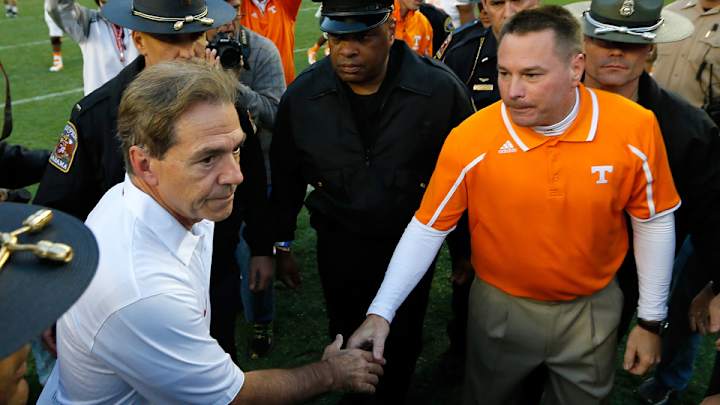Rivalry revisited: The third Saturday in October still for Alabama-Tennessee

Quick: who is Alabama’s biggest rival?
Given that they share a state, a lot of hate, and play in the Iron Bowl every year, it’s Auburn—right?
When it comes to enmity, that’s probably true. But if you judge by sheer volume of games, there’s no contest: It’s Tennessee. The Tide and the Volunteers have clashed 96 times since 1903. That’s the most games played against any opponent for Alabama and the third-most for Tennessee.
But the Vols’ top two opponents, Vanderbilt and Kentucky, barely count as opponents. UT has crushed those two schools more than 70 times each. The ’Bama-UT series is much closer: Alabama leads the alltime series 51-37-7, and that big Crimson Tide edge looks a lot wider thanks to a current seven-game Tide win streak that coincides with the Nick Saban era and Alabama’s recent SEC dominance. Still, this series has all the trappings of the better rivalries in college football history.
The series traces its roots to three coaching luminaries. Wallace Wade, the former Alabama coach (and Tennessee native) took the Crimson Tide to three national titles from 1925-1930. Tennessee coaching icon Robert Neyland, who had taken over the Vols in 1926, became friendly with Wade, and the two decided to restart the Alabama-Tennessee series that had been on hiatus for the past decade.
• Check out all the stops on Sport Illustrated's Go Rving Tailgate Tour
Future Alabama legend Paul “Bear” Bryant played in several of these rivalry games for the Crimson Tide, including a gutty 1935 meeting that Bryant soldiered through on a broken leg. Years later, Bear Bryant became head coach at Kentucky, and found himself continually bested by Neyland and Tennessee. In seven head-to-head meetings on the field, Neyland beat the younger Bryant five times, while all Bryant could muster was two ties. When Neyland retired Bryant allegedly remarked, “Thank God the old guy finally quit.”
Years of frustration fueled Bryant’s obsession with beating Tennessee, which continued once he took over at Alabama. That, more than anything, led to the intense hate on the field. For years, both Alabama and Tennessee fans had a saying: Don’t get married on the third Saturday in October. The late Beano Cook took it a step further, warning fans not to die on the third Saturday in October, either, since the preacher may not show up.
The third Saturday in October was the traditional game date for decades. That changed when the SEC split in 1992, and the game now floats between the last few Saturdays in the month. No matter the date, the winning school still celebrates in a familiar way. Fat cigars dangle from the mouths of winning players, a throwback to the 1950s Bryant-era Tide teams. Back then, Alabama head trainer Jim Goostree would dole out the stogies after wins over UT, and the tradition continues with Saban’s tacit approval.
When the SEC split into East and West divisions, the UT-Alabama rivalry game was preserved as a permanent rivalry game. While some questioned the decision given how one-sided the rivalry has been in recent years, it is important to note that UT took 10 of 11 meetings from 1995 through Saban’s first year in 2007, not counting a vacated Alabama win from 2005. The rivalry was an inextricable part of Tennessee’s 1998 national title, as Jeff Pearlman explained in a 1999 story on UT’s long football history. And while the last several games have been blowouts, this is a series that produced a classic five-overtime UT win back in 2003.
Complaining about this rivalry is no new phenomenon. After a 17-13 Tide victory over the Vols in 1994, William F. Reed declared in the pages of SI that it was “the most overhyped, underwhelming series in the South” thanks to Alabama’s dominance. Tennessee promptly won the next seven straight matches.
